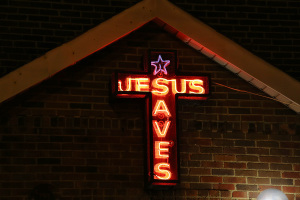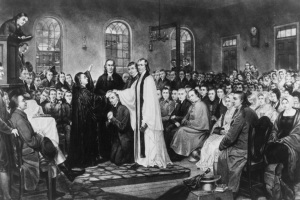Crucified 'Skeleton Santa' and 'Flying Spaghetti Monster' vs. Christianity
If a city includes a nativity scene in its holiday display, must it also include a sign mocking the Christmas story as a toxic myth? If the scene has an angel, must it have a devil, too?
Raising these strange questions is a new strategy adopted by militant atheist organizations like Freedom from Religion Foundation (FFRF). These groups-not content to practice their atheism privately-seek to scour public life of all religious references: nativity scenes, "Under God," Ten Commandment monuments, and the like.
Their most recent approach is to argue that, if there are to be any religious messages in the public square, then there must be equal space for their anti-religious messages.
Accepting this premise has resulted in some bizarre spectacles-as when a Northern Virginia county allowed "Skeleton Santa" to be crucified on its courthouse lawn, or when the city of Santa Monica sponsored a homage to the "Pastafarian" deity, the Flying Spaghetti Monster. Indeed, the Spaghetti Monster's incarnation convinced Santa Monica to ban all holiday displays.
The U.S. Sixth Circuit Court of Appeals recently struck a powerful blow against this tactic. Freedom from Religion Foundation v. City of Warren, Michigan, concerned a holiday display placed annually in Warren's civic center, featuring secular and religious symbols, such as a tree, reindeer, Santa's mailbox, nutcrackers, candy canes, a "Winter Welcome" sign, and a nativity scene. This last item drew the atheists' anathema.
After repeatedly petitioning Warren's Mayor James Fouts to remove the nativity scene, FFRF finally threatened to sue unless the city added an "sandwich board" announcing this: "At this season of THE WINTER SOLSTICE may reason prevail. There are no gods, no devils, no angels, No heaven or hell. There is only our natural world, [sic] Religion is but Myth and superstition That hardens hearts And enslaves minds."
Mayor Fouts fired back a letter rejecting the sandwich board because he thought its message was "antagonistic toward all religions." The Mayor added that he had "allowed a display in city hall celebrating Ramadan," but that he "would never have allowed a sign next to the Ramadan display mocking or ridiculing the Moslem religion." The Mayor ended with this plea: "During this holiday season, why don't we try to accomplish the old adage of 'Good will toward all'?" Unmoved, FFRF sued.
Writing for a unanimous panel, Sixth Circuit Judge Jeffrey Sutton easily found the nativity scene did not establish religion. There was really no serious question about that: the Supreme Court approved virtually the same display over three decades ago. Of greater significance is Judge Sutton's methodical demolition of the argument that the city of Warren must balance the nativity scene with an anti-religious message.
Judge Sutton explained that the holiday display is the city's speech and no one else's. By selecting items for its display, Warren crafts its own message; it does not create "a seasonal public forum" to host competing views of the holidays. The city therefore gets to choose messages and symbols it likes (like "Winter Welcome," Santa's mailbox, and a nativity scene), and to exclude those it doesn't (like a sandwich-board proclamation that "Religion is but / Myth and superstition / That hardens hearts / And enslaves minds").
To be sure, Judge Sutton explained, the First Amendment and our political process gives atheists every right to use their own speech to protest the nativity scene. They can stage an anti-nativity rally outside city hall. They can run likeminded candidates against the Mayor. They can complain at city council meetings. They can pass out leaflets and write op-ed columns. They can produce infomercials warning Warren's citizens about the heart-hardening and mind-enslaving powers of a group of statues representing Jesus, Mary, Joseph, the three Magi, shepherds, an Ox and an Ass. But what they cannot do, as Judge Sutton explained, is "commandeer the [city's] own voice to deliver its message."
Forget law; a basic knowledge of civics is enough to demolish this new atheist tactic. Government lives by words and symbols. Any government doomed to give "equal time" to objectors whenever it speaks would collapse into incoherence.
When local governments have felt pressured by FFRF's specious argument, absurdity has soon followed. Children in Loudoun County, Virginia were terrorized during the Christmas season by the county-approved Passion of Skeleton Santa. Santa Monica found itself sponsoring a shrine to the Flying Spaghetti Monster before simply exiting the holiday display business altogether. And Warren was nearly forced to adorn its display with the poetic equivalent of a sign saying, "You religious folk sure are mean and dumb."
The atheist strategy is not subtle. Where courts cannot be convinced to erase all religious symbolism from the public space, those spaces must be made safe for religion to be mocked and degraded until the only hope of civic peace is to ban displays altogether.
Judge Sutton's exposure of the legal and intellectual bankruptcy of this pernicious tactic is crisp, funny, and devastating. May it stiffen the spines of city council members the next time some proselytizing atheist delivers the threat, perhaps in verse: "Let reason prevail: Lose the nativity scene, or we crucify Santa."





























